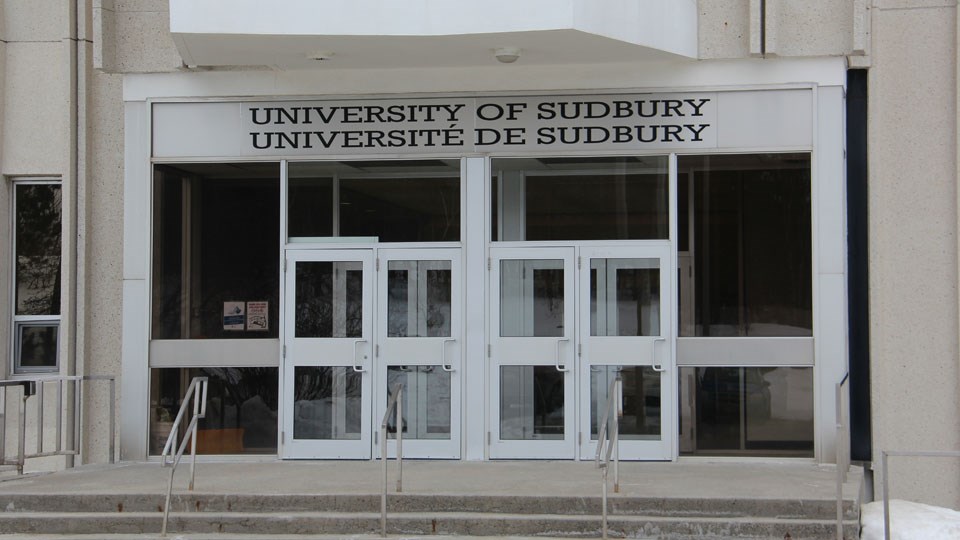A large frame hangs to my right in the president’s office at the University of Sudbury, an office I have now occupied for several months since my appointment this past summer. In this frame is a list of names etched in pale gold, names of those who sacrificed their youth, their innocence and sometimes their lives for the freedom and the future of our nation.
They are the alumni of Sudbury’s Sacred Heart College who fought for our country during the wars of the 20th century.
Every day, the names on that list, including Aubin, Serré, Paquette, and others, remind me that the University of Sudbury, founded in 1913 as the Collège du Sacré-Cœur, is an inspiring story of heritage, hope, and healing.
I cannot help but feel a swelling sense of pride that in their own small way, these alumni of the institution I now lead showed such daring, courage, and patriotism when Canada needed them most.
The University of Sudbury was founded as a French-language post-secondary institution at a time when it was illegal to teach French in our public schools. As Northern Ontario’s first university and the first French-language university in the province, the University of Sudbury has a storied history of training highly qualified, influential, and bilingual leaders.
Bélanger, Desmarais, Forest, Michel, Lacroix, and Roy are just some of the names of those who passed through the doors of our institution.
I am also quite fortunate that my predecessors built a solid foundation upon which we can move forward. They helped build and maintain a relationship based on trust with stakeholders, both at the community and government levels.
Indeed, our board of governors has proven itself excellent stewards of public funds. Not only does the university remain solvent, but the institution’s track record of fiscal prudence, strategic investments and thrift has led to its enduring debt-free status.
It is obvious that the university sector in the city of Greater Sudbury has gone through a traumatic turn of events due to the complex insolvency proceedings plaguing one of the key players in the city. Trust has eroded. Hundreds of people have lost their jobs.
Over a thousand students have opted against pursuing their university education in Sudbury which, in turn, has caused great stress and uncertainty regarding the future of our social, cultural, economic, and demographic future.
Although Sudbury’s reputation as the research, innovation and education capital of Northern Ontario has been severely jeopardized, the University of Sudbury is committed to bringing innovative solutions offering hope for a better future.
On March 11, the University of Sudbury’s board opted to return to its roots by adopting a new governance structure colloquially known as “Par, pour et avec.” This “by, for and with” model is one of hope and of empowerment. It allows for each community to govern themselves according to their specific aspirations and needs.
This partnership model, based on mutual respect and equality, is key to healing yesterday’s wounds to build a better and more inclusive and sustainable future.
Already, this new way of thinking has generated excitement and hope. A recent agreement between the University of Sudbury and Kenjgewin Teg (KT) has empowered this Indigenous-led institute to pursue Indigenous Studies in the region.
KT will embrace with open arms both Indigenous and non-Indigenous students to share this knowledge and experience with all. This partnership is not only a telling example of reconciliation, but a bold new way of thinking about and then delivering high-quality, sustainable, culturally relevant post-secondary education.
The same can be said for the University of Sudbury’s pivot back to its original and historic mandate. Far from being a return to a narrow-minded or parochial past, our renewed French-language mandate heralds the promise of economic, social, cultural, and demographic recovery by offering critically needed services to immersion, international and domestic students from all walks of life.
Students in Sudbury and the wider region who wish to immerse themselves in Sudbury’s rich Francophone history and tradition currently have no options.
Supporting the University of Sudbury isn’t just supporting a university — it’s supporting the idea of Francophone education, and a recognition of the importance of training a bilingual workforce so that Sudbury can maintain and grow its local talent, train the leaders of tomorrow, and maintain its competitive edge in a global economy.
It saddens me to see Francophone students from my hometown packing their bags and setting off for other cities or even other provinces, bereft of any real prospect of a French-language education. I know some will never return.
But it doesn’t have to be this way. Whether it comes from a sense of leadership or a simple love of home, it behooves us to want better than the declining status quo. We must summon the courage to fight for our home, our people, and our way of life. And that starts with a strong educational foundation where our best and our brightest don’t feel forced to leave home.
It is no secret that our university is fighting for its very survival. But I know that we have endured trials and challenges before. After all, the University of Sudbury, founded in 1913, is one of the oldest post-secondary institutions in the province. Its history is still not finished.
That frame etched with names in pale gold still stares at me. It reminds me that young people in Sudbury once made the ultimate sacrifice for Canada. As we approach Remembrance Day, we honour their memory and their sacrifice. And we honour their legacy by fighting in our own small way for the place they once called home.
Professor and historian Dr. Serge Miville is president and vice-chancellor of the University of Sudbury.
